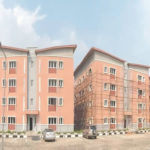The Nigerian Institute of Town Planners (NITP), Lagos State chapter, has expressed concerns over the incessant building collapse in Lagos metropolis and Nigeria in general.
Speaking at a press conference on activities being put together to mark the NITP Lagos chapter’s Annual General Meeting and 40th anniversary, its chairman, Mr Omotayo Awomosu, described the problem as “one that cast shadow on the built environment sector as it threatens the safety and security of citizens.”
According to him, town planners tended to be unfairly blamed whenever a building collapse, whereas “building does not collapse on papers.”
To tackle the menace of building collapse, he urged the need to beam the searchlights on “what happens at construction sites where the problem of sub-standard and poor quality jobs, non-use of professionals and other corner cutting activities tend to trigger collapse of buildings.”
It will be recalled that Lagos State recorded the highest number of building collapse incidents in the country in the last 10 years.
The latest being the collapse of a four-storey building in Surulere last weekend and another three-storey building in Kosofe, Ketu, penultimate Friday.
Awomosu also condemned the illegal developments and slum formulation across the country, saying they constitute threats to liveable communities.
While appealing to the state government to be proactive and alive to its roles of improving the quality of life of citizens, he called on the latter to voluntarily comply with all operative development plans, planning laws and regulations that are put in place to evolve liveable communities.
He also decried the increment in building plan assessment rates across board in the state, saying it would lead to proliferation of illegal developments and growth of slums.
The new rates,Awomosu pointed out were carried out outside the purview of the operative planning regulations.
He described the new rates as “prohibitive and retroactive” in implementation,
Apart from generating a lot of rancour and heated reactions in the built environment sector, he said the new building plan assessment rates contravened natural justice.
He said “The recent increment in building plan assessment rates across board in the state has been
generating a lot of rancour and heated reactions in the sector. This is because the increment was carried out outside the purview of the operative planning regulations; are prohibitive and retroactive in implementation.”
He said the association noted the likely negative effects on urban development across the state, urging the state authority to call for a stakeholders” meeting to consider the review of the rates.
If the new rates are allowed to stay, Awomosu warned that it would lead to increase in the cost of procuring development permits and hence construction cost.
“In the long tun, it will lead to further proliferation of illegal developments and the growth of slums, which will cost more to fix in the future,” he said.
Nigerian Tribune gathered that the increment is coming amidst increased financing costs, rising interest rates and inflation that have taken shine off real estate investments.
It is of experts’ opinion that the review of the permit rates, which is the third in two years, might further dampen the construction industry, as it affects building assessment, special enhancement levy, infrastructure development charge and stage certification in all Local Government Areas (LGAs).
Prior to the increase, building assessment is N10, 000 for one to 650 square meters and N4, 000 for subsequent 1,000 square meters for all areas, while stage certification is 35 per cent of building assessment and registration and application N5, 000 and N25, 000 respectively for all areas. The renovation fees are 25 per cent with former permit and 100 per cent with no proof of former permit.
Awomosu also expressed concerns about the state of the built environment, saying the association wished to see government adopting more robust measures to tackle the problems facing Nigerian cities.
“We also want the citizens to be more involved in the planning and development of our cities, especially as it relates to voluntary complying with laws and regulations put in place to better manage our settlements,” he said.
The chairman of Lagos’ NITP called for the implementation of existing physical development plans in the state, saying they contained proposals that if implemented could could accelerate infrastructural and social economic development across the state, and solve malignant problems such as traffic congestion, housing shortage, flooding and unemployment.
Why applauding the state government for investing heavily in the preparation of plans in recent times, Awomosu urged the authority to to embark on the preparation of regional plan for the state, and master plan for Lagos Mega City to guide its sustainable development.
“It’s also essential to prepare local plans to cover all communities in the state. The size of the latter task makes it necessary for local communities to be empowered to prepare their plans since government’s resources is finite,” the chairman said.
READ ALSO FROM NIGERIAN TRIBUNE






